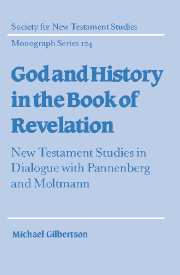 God and History in the Book of Revelation
God and History in the Book of Revelation Book contents
- Frontmatter
- Contents
- Preface
- Acknowledgements
- List of abbreviations
- 1 Setting the scene: a modern debate about faith and history
- 2 Relating scripture and systematic theology: some preliminary issues
- 3 Ways of approaching the Book of Revelation
- 4 The spatial dimension of the Book of Revelation
- 5 The temporal dimension of the Book of Revelation
- 6 Pannenberg, Moltmann, and the Book of Revelation
- 7 Conclusions
- Bibliography
- Index of passages cited
- Index of modern authors
- Index of subjects
2 - Relating scripture and systematic theology: some preliminary issues
Published online by Cambridge University Press: 22 September 2009
- Frontmatter
- Contents
- Preface
- Acknowledgements
- List of abbreviations
- 1 Setting the scene: a modern debate about faith and history
- 2 Relating scripture and systematic theology: some preliminary issues
- 3 Ways of approaching the Book of Revelation
- 4 The spatial dimension of the Book of Revelation
- 5 The temporal dimension of the Book of Revelation
- 6 Pannenberg, Moltmann, and the Book of Revelation
- 7 Conclusions
- Bibliography
- Index of passages cited
- Index of modern authors
- Index of subjects
Summary
Introduction
The aim of this study is to assess how far a reading of the Book of Revelation might be used to support or question recent theological understandings of the relationship between historical events and divine reality, with particular reference to the work of Pannenberg and Moltmann. Chapter 1 set the scene by giving an overview of the twentieth-century debate about the relationship between history and faith, within which the contributions of Moltmann, Pannenberg and others need to be seen. Chapters 3–5, will turn in detail to the text of the Book of Revelation, to explore the way in which the seer conceives of the relationship between God and human history. In chapter 6 I shall examine some of the conclusions reached by Pannenberg and Moltmann and reflect on these in the light of my reading of the text of Revelation. But before dealing in detail with either of the two poles of my subject – the text of Revelation on the one hand and contemporary systematic reflection on the other – it will be necessary to cover some foundational questions about how these two poles might relate to each other. That relationship has been the subject of prolonged and intensive scholarly discussion over the last two to three decades.
In this chapter I examine some of the different ways in which the relationship between biblical interpretation and systematic theology has been understood.
- Type
- Chapter
- Information
- God and History in the Book of RevelationNew Testament Studies in Dialogue with Pannenberg and Moltmann, pp. 20 - 44Publisher: Cambridge University PressPrint publication year: 2003


